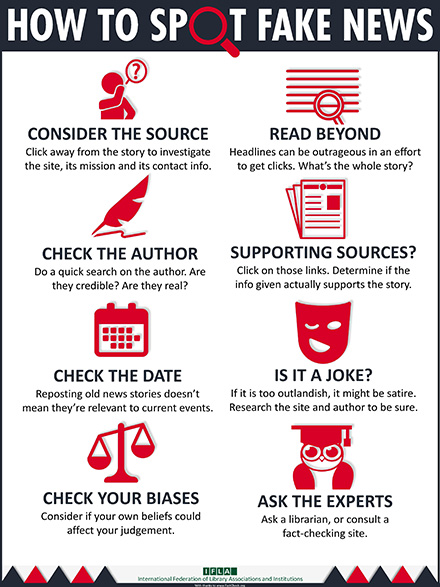Misinformation & Fake News
Fake or deliberately misleading stories are prevalent online and especially on social media. Sometimes these stories contain a grain of truth, some are wholly made up, and some are opinion masquerading as legitimate reporting. Before you cite something in a paper or hit “share,” take the following steps to help you spot fake news when you see it.

Consider the Source
Click away from the story to investigate the site, its mission and its contact information to verify that a site is a real news organization. Snopes.com maintains a list of known fake-news websites which attempt to pass as legitimate sources. Use the Ad Fontes Media Bias Chart to check the bias and accuracy of news sources.
Check the Author
Do a quick search on the author. Are they credible? Are they real? Can you find anything else they’ve published? Be especially skeptical if there is no author listed or the author is anonymous.
Check the Date
Reposting old news stories doesn’t mean they’re relevant to current events. Old stories, images and videos can be repackaged, or even re-dated to try and draw misleading conclusions. Use Google image search to check the legitimacy of photos, or right click on the photo and select Search with Google Lens.
Check your Biases
Consider if your own beliefs could affect your judgement. People are more inclined to believe a story if it confirms what they already believe, and to ignore information that doesn’t. If a story headline triggers outrage, take a moment to consider if the source is playing to your biases or has an agenda.
Read Beyond
Headlines can be outrageous in an effort to get clicks. What’s the whole story? Authors use these tactics to get your attention in hopes that you will spread their story on social media; be sure the story has substance and is not just clickbait.
Supporting Sources?
Click on those links. Determine if the information given actually supports the story. Authors may link to sources which actually dispel their claims if read carefully, or to outdated or debunked information.
Is it a Joke?
If it’s too outlandish, it might be satire. Research the site and author to be sure. A legitimate satire website will state that their work is fiction.
Ask the Experts
All this fact checking takes time! However, you have experts here to help you discern fact from fiction. Ask a librarian or consult a fact-checking site.
